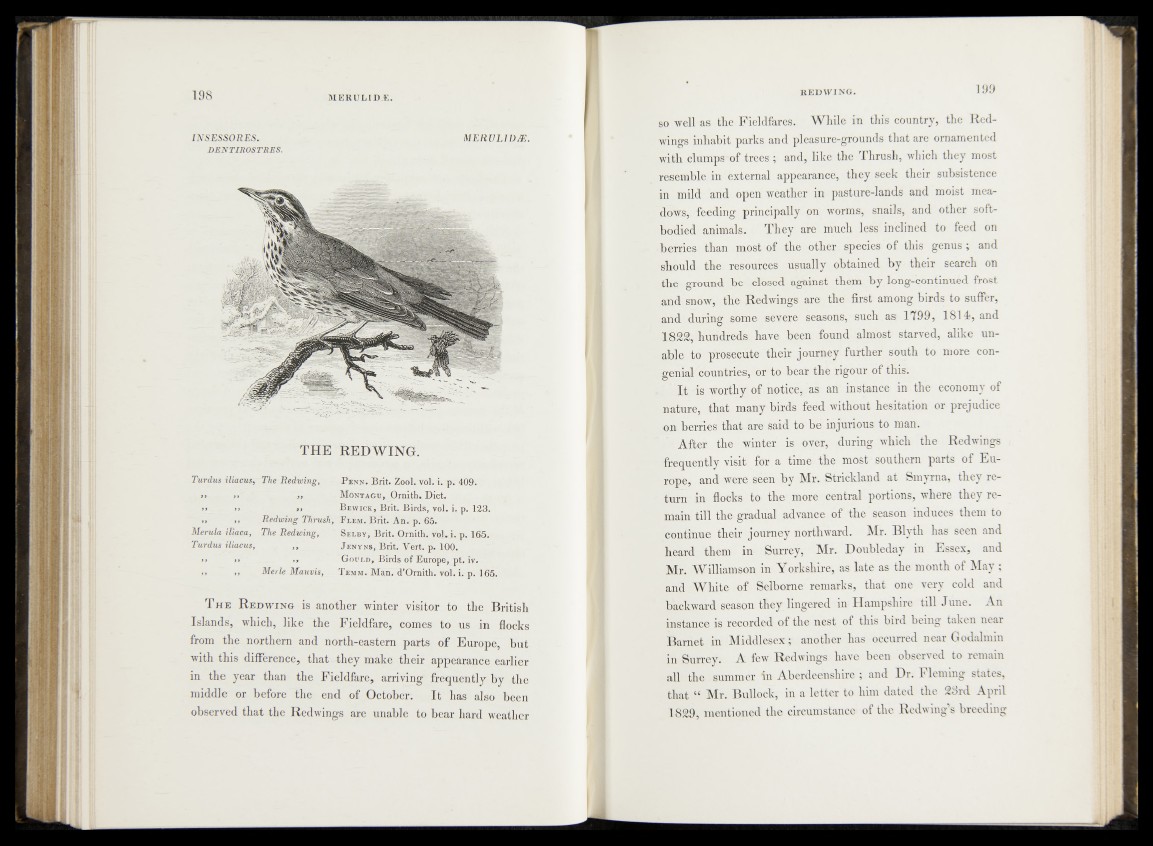
TH E R EDW IN G .
Turdus iliacus, The Redwing, P enn. Brit. Zool. vol. i. p. 409.
>> >» >, Montagu, Ornith. Diet.
»> >> B ewick, Brit. Birds, vol. i. p. 123.
,, ,, Redwing Thrush, F lem. Brit. An. p. 65.
Merula iliaca, The Redwing, S elby, Brit. Ornith. v ol. i. p. 165.
Turdus iliacus, „ J enyns, >> Brit. Vert. p. 100. it Gould, Birds of Europe, pt. iv.
.) >> Merle Mauvis, Temm. Man. d’Ornith. vol. i. p. 165.
T h e R e d w i n g is another winter visitor to the British
Islands, which, like the Fieldfare, comes to us in flocks
from the northern and north-eastern parts of Europe, but
with this difference, that they make their appearance earlier
in the year than the Fieldfare, arriving frequently by the
middle or before the end of October. It has also been
observed that the Redwings are unable to bear hard weather
so well as the Fieldfares. While in this country, the Redwings
inhabit parks and pleasure-grounds that are ornamented
with clumps of trees ; and, like the Thrush, which they most
resemble in external appearance, they seek their subsistence
in mild and open weather in pasture-lands and moist meadows,
feeding principally on worms, snails, and other soft-
bodied animals. They are much less inclined to feed on
berries than most of the other species of this genus ; and
should the resources usually obtained by their search on
the ground be closed against them by long-continued frost
and snow, the Redwings are the first among birds to suffer,
and during some severe seasons, such as 1*799, 1814, and
1822, hundreds have been found almost starved, alike unable
to prosecute their journey further south to more congenial
countries, or to bear the rigour of this.
I t is worthy of notice, as an instance in the economy of
nature, that many birds feed without hesitation or prejudice
on berries that are said to be injurious to man.
After the winter is over, during which the Redwings
frequently visit for a time the most southern parts of Europe,
and were seen by Mr. Strickland at Smyrna, they return
in flocks to the more central portions, where they remain
till the gradual advance of the season induces them to
continue their journey northward. Mr. Blyth has seen and
heard them in Surrey, Mr. Doubleday in Essex, and
Mr. Williamson in Yorkshire, as late as the month of May ;
and White of Selborne remarks, that one very cold and
backward season they lingered in Hampshire till June. An
instance is recorded of the nest of this bird being taken near
Barnet in Middlesex; another has occurred near Godalmin
in Surrey. A few Redwings have been observed to remain
all the summer in Aberdeenshire ; and Dr. Fleming states,
that “ Mr. Bullock, in a letter to him dated the 23rd April
1829, mentioned the circumstance of the Redwing’s breeding